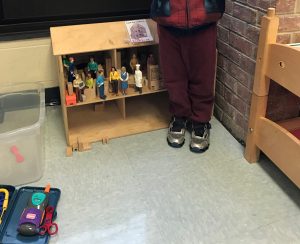Back to preschool today. If you know the parent of this child, please pass my post along.
I’ll call him “Peter.” He likes Spider-Man. He’s verbal. He can tell you what he likes. If you ask, he will share what he is thinking when he has the words. He’s not quite four, though, and he’s straddling two languages. Communication can be tough. But he’s not afraid to try to talk.
In a public preschool, some children cannot or do not talk. That silence leads directly to interventions providing them with early schooling and early social services. Kids may see counselors, social workers, speech pathologists and other experts as needed. Some kids will receive the whole gamut of services.
Peter’s problems are mostly behavioral. He’s a three-year old bully. He’s a scary, three-year-old bully who does not need a provocation to hit, kick or pull hair. He’s persistent, too. Sit him down for snack and he kicks kids under the table. Put him in a line in gym along the wall and he reaches for a nearby girl’s hair. The kids shrink away from him. They watch him all the time. In a room where disputes over who-had-what-first are common, the kids leave him alone. If he wants to play house, no one takes a chair or plastic kid out of that house.
The teacher wants him watched throughout the morning and I know why she worries. Somebody should be watching this kid every minute because he is steamrolling through toddlerhood with his fists cocked. He’s not exactly out of control. If he knows I am watching, nothing will happen, unless someone deliberately reaches for a toy he has chosen and, as I said, the kids are mostly keeping a wide distance. He sits down near a girl in the gym and she automatically slides out of reach. He sits down next to a boy and that boy moves his chair as far left as possible, until stopped by the girl next to him. Peter’s fellow students are waiting for the blow to land.
One-on-one with an adult, this boy does well. If he can monopolize his teacher, her aide, or another adult, Peter will play quietly. The room purrs along as other kids go about their business.
A few different thoughts come to mind here:
- Peter still has at least one year of services and he may learn to manage himself before kindergarten. Mostly, anyway. The Peters of the world seldom abandon their desire to kick. They can and do learn to control that desire in lower-stress situations. If you know parents with a Peter, please encourage those parents to seek help. They may have to push. But behavioral disorders can respond well to interventions.
- If you have a child in a class with a Peter, it’s time to begin teaching anti-bullying strategies. Now. Don’t trust the teacher to manage. Peter’s already skilled at knowing when adult eyes are looking elsewhere. Your best and main strategy will be avoidance, but learning to speak up and loudly say, “Keep your hands away from my hair!” will help too. In early years, tattling won’t carry much social stigma. “Teacher, he kicked me!” won’t cost a kid socially and should help keep Peter’s feet on the floor.
- Let’s hope Peter’s family understands that “boys will be boys” does not apply to their boy. Once the kids in class all started watching Peter because he made them nervous, the family had reached the intervention stage. When all the kids in the playgroup avoid a child, that child and his or her family need help.
- If you are teaching a Peter, try to set aside kindness for him. Peter needs to see kindness and compassion modeled regularly. But (I’m sure I am preaching to the choir) he also must come to understand that kicking is a loser and he will be isolated if he cannot keep his hands and feet to himself.
- Parents, talk to the teacher before you talk to the administration. Find out how she is managing her challenge. Find out if she feels able to manage the challenge. Ask her what you can do to help.
- Parents, raise hell with the administration if you must. If your child does not feel safe, you must. Some Peters will eventually require special placements. The teacher in this classroom happens to be strict and alert. She can handle her Peter. But I have seen less safe situations. Unfortunately, some kids should never be handed the scissors, period. Even the wrong-shaped puzzle piece can be a problem.
- Teachers, keep documenting and sharing your documentation. Yes, I SO know you have a gazillion+ things to do. But the sooner everyone knows that Peter has become an emergency, the better. One problem with our current data and testing frenzy has become the lack of time to work on individual situations. Peter should not get lost as we make our 100th new, required spreadsheet of the year. I absolutely am not criticizing anybody here. I’ve had the where-can-I find-time problem, along with the who-can-I-find-who-will-listen-to-me problem.
- Hugs to all the teachers out there who are managing as best they can, with love and appreciation for their students, even as they use their week-end to amass their data for the week.

